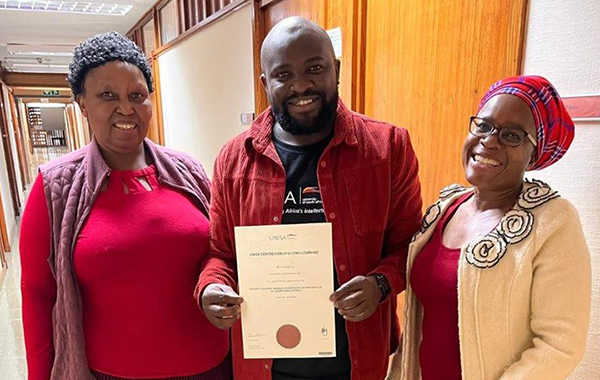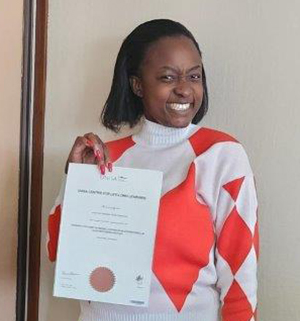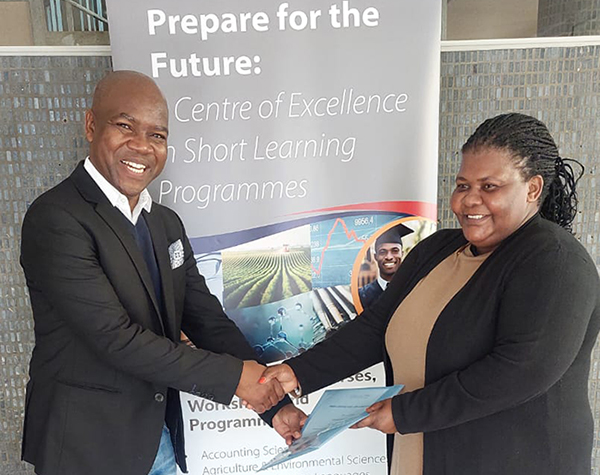College of Human Sciences
Boost for linguistic diversity as staff become conversant with additional languages
Recently, specialists from Unisa’s Language Unit (LU) were delighted to present Basic Communication Skills certificates to academic and administrative staff members who successfully completed their assessments.

Certificate recipient Ndivhuwo Sundani (centre) with facilitators Dr Seleka Tembane (left) and Dr Francinah Kanyane (right)
The LU is located within the Department of Tuition Support and Facilitation of Learning. In October 2018, the unit was established as a five-year strategic project called Transformation: Building Capacity for South African Languages. One of its objectives was to promote the learning of an additional language.
It is the responsibility of the LU to facilitate and assist all sections of the university to engage in functional multilingualism through the promotion of equitable use of all South African languages, including South African Sign Language. This is in line with the 2016 Unisa Language Policy Section 4.8.1, which reads:

A delighted Aluwani Netshitongwe with her certificate
"The University provides facilities through the relevant department(s) or otherwise to advocate and encourage employees to learn an African language and South African Sign Language, and to increase their competence in any medium of instruction. These courses will be predominantly conversational in character, content and form to enable employees to communicate effectively."
The learning of an additional language is further affirmed by the Language Policy Framework for Public Higher Education Institutions (2020), which calls for the advancement of indigenous languages as languages of learning and teaching, communication, research and scholarship.
The LU, in partnership with the College of Human Sciences (CHS) and Unisa Centre for Lifelong Learning (UCL), resuscitated the Short Course in Basic Communication Skills in 2019. The short course is conversational in nature. The target group was the staff in academic and administration departments. Languages that were facilitated by LU included Sepedi/Sesotho sa Leboa, isiZulu, Setswana, Xitsonga and Siswati. Facilitators were the following staff members from the Department of African Languages:
- Sepedi/Sesotho sa Leboa: Dr Francinah Kanyane, Dr Seleka Tembane and Lucy Ndhlovu
- IsiZulu: Dr Celani Zwane and Dr Eric Nzimande
- Siswati: Dr Rhema Lubambo
- Setswana: Pemla Ditsele
- Xitsonga: Delva Mabaso
The attendance from 2019 to 2023 was good, and attendees showed keen interest in learning indigenous languages. In 2022 and 2023, the LU provided Sepedi and siSwati classes only, due to the Department of African Languages facilitating other languages. The number of Unisa staff members who registered to learn an additional language and completed the assessments is 238.
May 2024 highlight: Handover and issuing of certificates
After various engagements, 90 certificates were handed over by Innocentia Khoza of the UCL to the LU coordinator, Dr Mutshinyani Mahwasane. The staff members who attended Basic Communication Skills classes in Sepedi/Sesotho sa Leboa, isiZulu, siSwati, Setswana and Xitsonga received their certificates. The smiles and excitement of the participants when signing the handover forms and receiving their certificates were remarkable.

Samuel Kekana, Acting Director: Unisa Centre for Lifelong Learning, and Dr Mutshinyane Mercy Mahwasane, Coordinator: Basic Communication Skills classes
Comment from a recipient on learning an additional language
"The course met my needs and expectations in that it introduced me to common expressions used in greetings, introductions, and basic conversations in Northern Sotho. Some of the basic expressions surprised me as they were different from what I had picked up informally, or from the colloquial language known as SePetori. For instance, the instructors insisted on the use of formal expressions such ke gona instead of ke teng. It was a pleasant challenge that got me excited about learning the real Northern Sotho!
The teaching methods, scope and learning pace were excellent. We attended face-to-face classes and got opportunities to work in pairs and groups and to practise our pronunciations over and over.
By the end of the course, I was more confident with my greetings and introductions and had a bigger vocabulary to mention items in shops by their Northern Sotho names, and to request filling station services in the language. We even went beyond the language to learn more about the culture associated with the language. For example, we learnt about visiting a bereaved family and selecting the right vocabulary to express ourselves in a culturally acceptable manner. Overall, I enjoyed and benefited a lot from the course.
However, the course remains at the most basic level. One would have to study the language further to be conversant enough to teach, mark, research, engage with communities, and support students in the language."
Setbacks
- Shift from face-to-face to virtual classes due to Covid-19 can be viewed as a setback, as learners wanted to see the facilitators demonstrating the articulation of sounds and the pronunciation of words. The facilitators had to devise teaching techniques that made the virtual lessons more practical and meaningful.
- As time progressed, some attendees were not keen to write assessments. They were interested in learning the languages without the requirement for assessments. The facilitators emphasised the importance of assessments, and some attendees agreed to write assessments so that they could receive a certificate.
Concluding remarks
The LU facilitated Basic Communication Skills classes to implement the Unisa Language Policy and to ensure that Unisans are familiar with other South African official languages. Learning more languages helps us express our feelings and desires and ensures that we can communicate with those around us.
A willingness to explore new cultures and ways of life is essential. This adaptability includes being prepared to communicate with new people in various languages. Being unable to communicate in a multilingual country like South Africa makes it extremely difficult to adapt and communicate with those you encounter. In a multilingual institution with diverse languages such as Unisa, learning an additional language is a support intervention for students to access information in their mother languages.
Gratitude for this success goes to the institution for providing resources, the UCL team, our facilitators and collaborators from CHS who showed dedication in advancing the indigenous languages, and the attendees of the short learning programme who managed to journey with us until completion. In monitoring the language policy of the University of South Africa, the LU team is committed to creating an environment where multilingualism is seen as a resource to facilitate transformation, access to information, social cohesion and respect for all languages.
* By Dr Mutshinyani Mahwasane, Language Specialist and Coordinator, Department of Tuition Support and Facilitation of Learning
Publish date: 2024/06/18

 Unisa co-hosts G20 community outreach in the Eastern Cape
Unisa co-hosts G20 community outreach in the Eastern Cape
 Unisans gain membership of prestigious science academies
Unisans gain membership of prestigious science academies
 Advocating for disability transformation through servant leadership
Advocating for disability transformation through servant leadership
 Unisa Press continues to illuminate the publishing space
Unisa Press continues to illuminate the publishing space